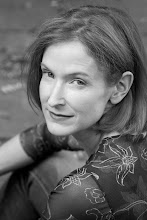Yesterday, as various folks around the world gave a nod to the creator of Nicholas Nickleby, Oliver Twist, David Copperfield and Little Nell--who presumably celebrated his 200th birthday with a glass of Port on some convenient celestial perch--I paused a moment in my guest room to offer Many Happy Returns to Charles Dickens myself.
Framed on the wall is one of the man's letters. It wasn't written to me, of course--but I shamelessly read it anyway. It's a small note written on blue-gray paper, with its original envelope, addressed and sealed with Dickens's wax, the color of dried blood.
The framer, sadly, couldn't show both sides of the envelope at once, so the wax seal is hidden from view, a treasure for some future generation to find when they reframe the thing in 2312. The visible side is some compensation--Dickens signed the envelope as well as the note, and there's a great old penny postage stamp with Queen Victoria pretending to be Caesar's wife in the upper corner. The ink is faded to a sepia brown.
Here's what the letter says:
Devonshire Terrace
Thirtieth November 1842
My Dear Count D'Orsay
We shall all three be delighted to dine at Gore House on Friday; and, (as you do not mention the hour) we shall take it for granted that you dine at Half past Seven, unless we hear to the contrary.
Always believe me
faithfully yours
Charles Dickens
He scrawled his signature emphatically across the bottom of the page, and underscored it with a scrolling motion at least ten times. And yes, that's a comma you see before the parenthesis. Perhaps our habit of placing it after is hopelessly twenty-first century.
It's a commonplace note enough. The Comte D'Orsay was a flamboyant figure in Dickens's day, an artist, a dandy, a wealthy man who loved to entertain. But who are "we three?" And what exactly did they dine on? Did D'Orsay keep the note for decades, or did his valet pilfer it? And how did it end up in my mother's closet, a hundred and fifty years later? The devil of it is, nobody in my family really knows. It's our own little Mystery of Edwin Drood.
There's an import duty receipt for one hundred and forty-five pounds from a dealer named Maggs Brothers, located at 50, Berkeley Square, London, to a dealer in Bethesda, Maryland, dated 1977. We lived in Potomac at the time; and that was the year my father died. The story of how he came by Dickens's careless acceptance of a dinner invitation, died with him. It was only in the last years of my mother's life that the letter was discovered at all--and my sisters kindly passed it on to me. They figured that as a writer, I'd cherish it.
I do. I thought about hanging it opposite my desk, where I can see it every day; and maybe at some point I will. For now, though, it hangs in the guest room, so that anybody transiting through Denver can glance at that sprawling, flamboyant, dramatic fist--and hear an entire world of fantastic characters whispering from the faded ink.
Happy birthday, Charles.
Stephanie
Wednesday, February 8, 2012
Subscribe to:
Posts (Atom)





